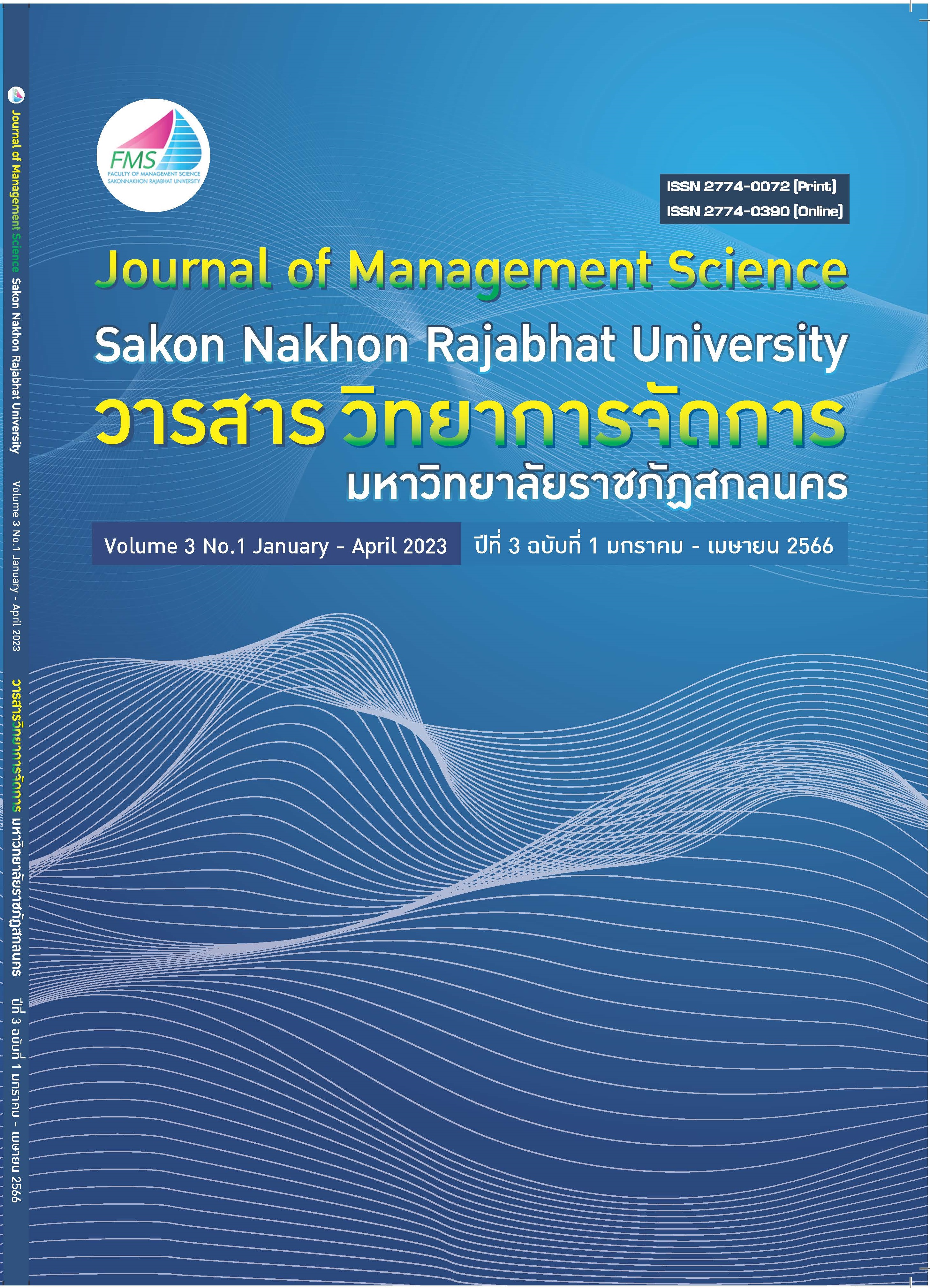Ethical leadership of Institution administrators affiliated with Nong khai primary educational service area office 1
Keywords:
ผู้นำเชิงจริยธรรม, ผู้บริหารโรงเรียนAbstract
ABSTRACT
The objectives of this research were; 1) to study the level of ethical Leandership compare leandership and ethical leadership development guidelines of Institution dministrators affiliated with Nong khai primary educational service area office 1 The sample groups used in this research were administrators and teachers. 295 were obtained by simple random sampling in proportion to the population of the school size. The research instrument was a 5-level estimation scale questionnaire Level accuracy (IOC) between 0.67-1.00 with the reliability of 0.86 data collection tools the statistics employed for data analysis were percentage, mean, standard deviation and one way anova when it found a difference, it was tested by Scheffe’s Method.
The results of the study found that:
- Ethical leadership level is The overall picture is at a high level. The side with the
highest mean was Justice, followed by trust and honesty The side with the least mean is aspect of empathy
- The comparison of ethical leadership found that School administrators large and
small had statistically significant differences in ethical leadership 0.05 the other pairs were not statistically significant 0.05
- ethical leadership development guidelines it executives must also perform their
duties. Objectivity has no conflicts of interest. Be neutral without bias the facts should be carefully studied to prevent mistakes in school justice decisions. and assign tasks to subordinates according to their knowledge, abilities and voluntary
Keywords: Ethical leader, administrator
References
ดวงทิพา พุ่มไม้. (2557). การศึกษาสภาพและแนวทางการพัฒนาภาวะผู้นำเชิงจริยธรรมของผู้บริหารสถานศึกษาสังกัดองค์กรปกครองส่วนท้องถิ่นจังหวัดสุโขทัย. วิทยานิพนธ์ปริญญาครุศาสตร มหาบัณฑิต สาขาวิชาการบริหารการศึกษา. พิษณุโลก: มหาวิทยาลัยราชภัฏพิบูลสงคราม.
บุญชม ศรีสะอาด. (2554). หลักการวิจัยเบื้องต้น. พิมพ์ครั้งที่ 9. กรุงเทพฯ: สุวิริยาสาส์น.
เพ็ญศิริ สมเรือน. (2560). ภาวะผู้นำเชิงจริยธรรมของผู้บริหารสถานศึกษา สังกัดสำนักงานเขตพื้นที่ การศึกษาประถมศึกษาตราด. วิทยานิพนธ์ปริญญาศึกษาศาสตรมหาบัณฑิต สาขาวิชาการบริหาร การศึกษา บัณฑิตวิทยาลัย. ชลบุรี: มหาวิทยาลัยบูรพา.
ภานุวัฒน์ บุญธัญกิจ. (2564). ภาวะผู้นำเชิงจริยธรรมที่พึงประสงค์ของผู้บริหารสถานศึกษา สังกัดกรุงเทพมหานคร. วิทยานิพนธ์หลักสูตรการศึกษามหาบัณฑิต สาขาวิชาการจัดการศึกษา คณะ ศึกษาศาสตร์. ชลบุรี: มหาวิทยาลัยบูรพา.
รัตติกรณ์ จงวิศาล (2556). ภาวะผู้นำ: ทฤษฎี การวิจัย และแนวทางสู่การพัฒนา. กรุงเทพฯ: สำนักพิมพ์แห่งจุฬาลงกรณ์มหาวิทยาลัย.
วิโรจน์ สารรัตนะ. (2553). แนวคิด ทฤษฎี และประเด็นเพื่อการบริหารทางการศึกษา. พิมพ์ครั้งที่ 8. กรุงเทพฯ: ทิพยวิสุทธิ์.
เศรษฐ์ คุณทาบุตร. (2556). ภาวะผู้นำเชิงจริยธรรมของผู้บริหารโรงเรียนมัธยมศึกษา จังหวัดเลย. วิทยานิพนธ์ศึกษาศาสตรมหาบัณฑิต แขนงวิชาบริหารการศึกษา บัณฑิตวิทยาลัย. นนทบุรี: มหาวิทยาลัยสุโขทัยธรรมาธิราช.
สลิลทิพ ชูชาติ. (2556). พฤติกรรมเชิงจริยธรรมของผู้บริหารในการบริหารสถานศึกษา สังกัดสำนักงานเขตพื้นที่การศึกษาแระถมศึกษากำแพงเพชร เขต 2. วิทยานิพนธ์พุทธศาสตรมหาบัณฑิต สาขาวิชา การบริหารการศึกษา บัณฑิตวิทยาลัย. พระนครศรีอยุธยา: มหาวิทยาลัยจุฬาลงกรณราชวิทยาลัย.
สำนักงานเขตพื้นที่การศึกษามัธยมศึกษาหนองคาย; กลุ่มนโยบายและแผนสำนักงานฯ. (2565). แผนปฏิบัติการประจำปี 2565. หนองคาย: ผู้แต่ง.
สำนักงานคณะกรรมการการศึกษาแห่งชาติ; สำนักนายกรัฐมนตรี. (2553). พระราชบัญญัติการศึกษาแห่งชาติ พ.ศ 2542 แก้ไขเพิ่มเติม (ฉบับที่ 3) พ.ศ. 2553. กรุงเทพฯ: พริกหวานกราฟฟิค.
แสงสุริยา ศรีพูน. (2563). การศึกษาภาวะผู้นำเชิงพฤติกรรมของผู้บริหารสถานศึกษาที่ส่งผลต่อแรงจูงใจในการปฏิบัติงานของบุคลากรในสถานศึกษา สังกัดสำนักงานเขตพื้นที่การศึกษาประถมศึกษาหนองคาย เขต 1. สารนิพนธ์ศึกษาศาสตร์มหาบัณฑิต. อุดรธานี: วิทยาลัยสันติพล.
สุรัตน์ ไชยชมภู. (2557). ภาวะผู้นำเชิงจริยธรรมในการบริหารสถานศึกษา. วารสารการบริหารการศึกษา มหาวิทยาลัยบูรพา, 8(2), 1-15.
สุรีวัลย์ ดาราพงษ์. (2557). การใช้อำนาจของผู้บริหารสถานศึกษา สังกัดสำนักงานเขตพื้นที่การศึกษาประถมศึกษาตราด. งานนิพนธ์การศึกษามหาบัณฑิต สาขาวิชาการบริหารการศึกษา คณะ ศึกษาศาสตร์. ชลบุรี: มหาวิทยาลัยบูรพา.
Brown, M. E., Treviño, L. K., & Harrison, D. A. (2005). Ethical leadership: A social learning perspective for construct development and testing. Organizational Behavior and Human Decision Processes, 97(10).
Krejcie, R. V., & D. W. Morgan. (1970). “Determining Sample Size for Research Activities”. Educational and Psychological Measurement, 30(3), 607 – 610.
Downloads
Published
How to Cite
Issue
Section
License
Copyright (c) 2023 JOURNAL OF MANAGEMENT SCIENCE SAKON NAKHON RAJABHAT UNIVERSITY

This work is licensed under a Creative Commons Attribution-NonCommercial-NoDerivatives 4.0 International License.
An article published in the Journal of Management Science. Sakon Nakhon Rajabhat University is the opinion, copyright and responsibility of the author of the work.







